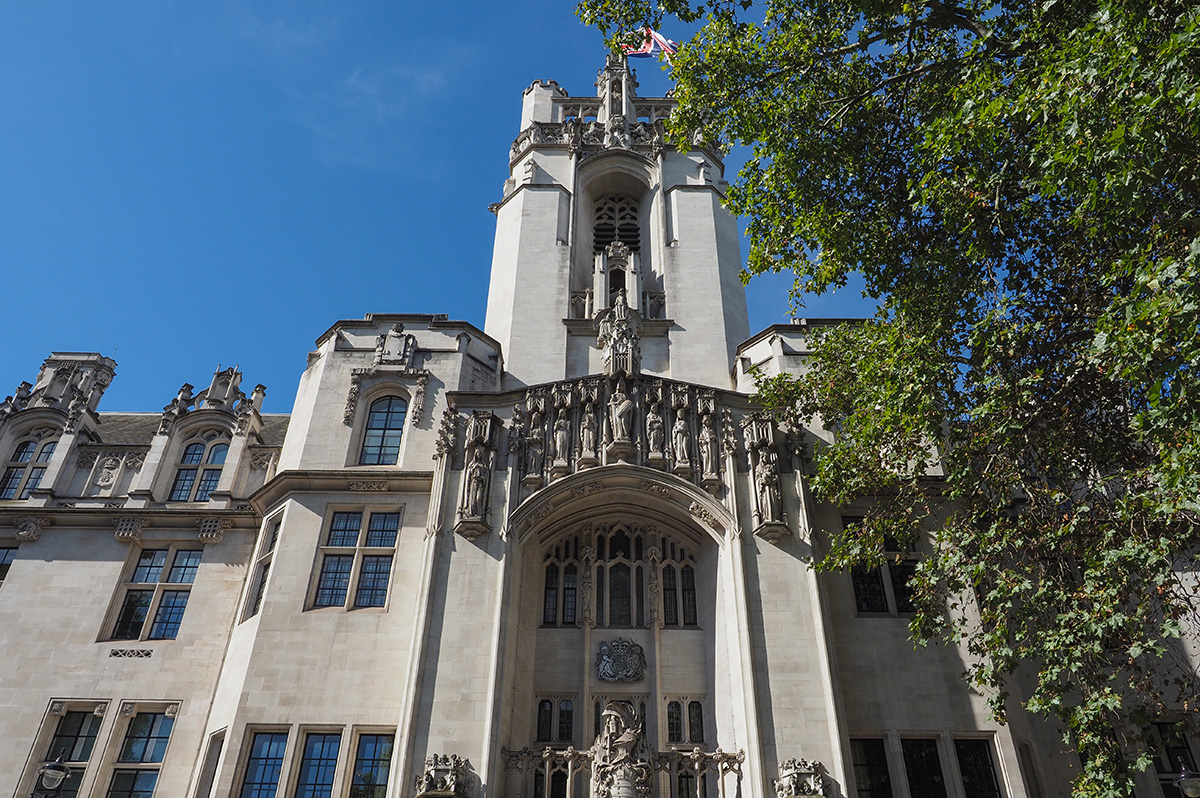News
Eyes on 10th Circuit for Utah, Okla. marriage arguments
Set to become first appeals court to hear post-DOMA case


(Image courtesy Wikimedia Commons).
The progression of a marriage equality lawsuit to the U.S. Supreme Court will reach a significant milestone this month when, for the first time since landmark rulings last year, a federal appeals court will consider arguments on the issue of gay nuptials.
The U.S. Tenth Circuit Court of Appeals is set to hear oral arguments on April 10 in Denver in the case of Kitchen v. Herbert, the lawsuit that brought marriage equality briefly to the state of Utah, and will hear arguments April 17 in Bishop v. Smith, in which a lower court ruled Oklahoma’s ban on same-sex marriage is unconstitutional.
Doug NeJaime, a law professor at the University of California, Irvine, said he expects arguments from attorneys on behalf of same-sex couples during these arguments to focus on the impact of the states’ marriage bans on children.
“I expect we will see significant attention on the child centered rationales put forward by the state with responses regarding the detrimental impact on children raised by same-sex couples. Children are figuring prominently in these cases,” NeJaime said. “I also expect discussion about how Windsor affects the analysis of state bans on marriage.”
The harm to children raised by same-sex parents as a result of the Defense of Marriage Act was a significant factor in U.S. Associate Justice Anthony Kennedy’s decision last year against the ban. Numerous district courts have cited that language in their decisions striking down marriage bans.
The Tenth Circuit is one of five circuits where marriage equality cases are pending, but it’s hearing oral arguments sooner than the others following a decision to hear the litigation on an expedited basis.
Camilla Taylor, marriage director for Lambda Legal, said she’s optimistic both the Utah and Oklahoma cases are likely to succeed on the merits following the arguments.
“The briefing is extremely strong,” Taylor said. “There’s been a huge array of amicus briefs to go in. This will be the first oral argument in a federal circuit court, and so, of course it will be closely watched.”
Although the arguments mark the first time a federal appeals court has heard arguments on the marriage issue since the decisions against DOMA and California’s Proposition 8 last year, it’s not the first time ever a federal appeals court has heard arguments on whether a state can ban same-sex marriage. The U.S. Ninth Circuit Court of Appeals heard arguments in the case against Prop 8 in 2011 before striking down the amendment the following year.
The three-panel judge who’ll hear the marriage equality arguments in both cases consists of Judge Paul Kelly Jr., an appointee of President George H.W. Bush; Judge Carlos Lucero, a Clinton appointee; and Judge Jerome Holmes, an appointee of President George W. Bush.
Notably, Holmes was one of two judges that denied Utah’s request for a stay on same-sex marriages in Utah after a district court ruled the state’s marriage ban unconstitutional, but the U.S. Supreme Court stepped in to institute a stay.
Observers will likely be examining judges’ questions to make a prediction on the outcome of the ruling, though Lambda’s Taylor cautioned against placing too much emphasis on the line of questioning during the arguments.
“I think it’s always difficult to tell from oral arguments which way a court is likely to rule,” Taylor said. “I’m hoping folks won’t draw too many conclusions from which questions are asked because judges during oral arguments ask questions because they’re seeking the best formulated answer that they themselves wish to give in an opinion, so a question isn’t necessarily an indication of which way a court is likely to rule.”
Arguments in other appeals courts are somewhere down the line. The U.S. Fourth Circuit Court of Appeals, which is hearing the Virginia case, have set arguments for May 13. The appeals courts for the Fifth, Sixth and Ninth Circuits have not set a date as of Wednesday for arguments to hear the marriage equality issues.
According to the Human Rights Campaign, at least 55 marriage equality court cases are working their way through the courts across the country. These cases have been filed in 28 states — as well as Puerto Rico — and account for nearly 250 plaintiffs taking on state marriage bans.
As all of these cases make their way back to the Supreme Court, observers expect justices to take up one — if not all — of them during the year-long term beginning in fall 2014. That would likely mean a nationwide decision on marriage equality by the middle of 2015.
U.S. Military/Pentagon
Pentagon urged to reverse Naval Academy book ban
Hundreds of titles discussing race, gender, and sexuality pulled from library shelves

Lambda Legal and the Legal Defense Fund issued a letter on Tuesday urging U.S. Defense Secretary Pete Hegseth to reverse course on a policy that led to the removal of 381 books from the Nimitz Library of the U.S. Naval Academy in Annapolis, Md.
Pursuant to President Donald Trump’s executive order 14190, “Ending Radical Indoctrination in K-12 Schooling,” the institution screened 900 titles to identify works promoting “diversity, equity, and inclusion,” removing those that concerned or touched upon “topics pertaining to the experiences of people of color, especially Black people, and/or LGBTQ people,” according to a press release from the civil rights organizations.
These included “I Know Why the Caged Bird Sings” by Maya Angelou, “Stone Fruit” by Lee Lai, “The Hate U Give” by Angie Thomas, “Lies My Teacher Told Me: Everything Your American History Textbook Got Wrong” by James W. Loewen, “Gender Queer: A Memoir” by Maia Kobabe, and “Democracy in Black: How Race Still Enslaves the American Soul” by Eddie S. Glaude, Jr.
The groups further noted that “the collection retained other books with messages and themes that privilege certain races and religions over others, including ‘The Clansman: A Historical Romance of the Ku Klux Klan’ by Thomas Dixon, Jr., ‘Mein Kampf’ by Adolf Hitler, and ‘Heart of Darkness’ by Joseph Conrad.
In their letter, Lambda Legal and LDF argued the books must be returned to circulation to preserve the “constitutional rights” of cadets at the institution, warning of the “danger” that comes with “censoring materials based on viewpoints disfavored by the current administration.”
“Such censorship is especially dangerous in an educational setting, where critical inquiry, intellectual diversity, and exposure to a wide array of perspectives are necessary to educate future citizen-leaders,” Lambda Legal Chief Legal Officer Jennifer C. Pizer and LDF Director of Strategic Initiatives Jin Hee Lee said in the press release.
Federal Government
White House sues Maine for refusing to comply with trans athlete ban
Lawsuit follows months-long conflict over school sports in state

The Justice Department is suing the state of Maine for refusing to comply with President Donald Trump’s executive order banning transgender athletes from participating in school sports, U.S. Attorney General Pam Bondi announced on Wednesday.
DOJ’s lawsuit accuses the state of violating Title IX rules barring sex discrimination, arguing that girls and women are disadvantaged in sports and deprived of opportunities like scholarships when they must compete against natal males, an interpretation of the statute that reverses course from how the law was enforced under the Biden-Harris administration.
“We tried to get Maine to comply” before filing the complaint, Bondi said during a news conference. She added the department is asking the court to “have the titles return to the young women who rightfully won these sports” and may also retroactively pull federal funding to the state for refusing to comply with the ban in the past.
Earlier this year, the attorney general sent letters to Maine, California, and Minnesota warning the blue states that the department “does not tolerate state officials who ignore federal law.”
According to the Maine Principals’ Association, only two trans high school-aged girls are competing statewide this year. Conclusions from research on the athletic performance of trans athletes vis-a-vis their cisgender counterparts have been mixed.
Trump critics and LGBTQ advocates maintain that efforts to enforce the ban can facilitate invasive gender policing to settle questions about an individual athlete’s birth sex, which puts all girls and women at risk. Others believe determinations about eligibility should be made not by the federal government but by school districts, states, and athletics associations.
Bondi’s announcement marked the latest escalation of a months-long feud between Trump and Maine, which began in February when the state’s Democratic governor, Janet Mills, declined to say she would enforce the ban.
Also on Wednesday, U.S. Education Secretary Linda McMahon said the findings from her department’s Title IX investigation into Maine schools — which, likewise, concerned their inclusion of trans student-athletes in competitive sports — was referred to DOJ.
Earlier this month, the Justice Department pulled $1.5 million in grants for Maine’s Department of Corrections because a trans woman was placed in a women’s correctional facility in violation of a different anti-trans executive order, while the U.S. Department of Agriculture paused the disbursement of funds supporting education programs in the state over its failure to comply with Title IX rules.
A federal court last week ordered USDA to unfreeze the money in a ruling that prohibits the agency from “terminating, freezing, or otherwise interfering with the state’s access to federal funds based on alleged Title IX violations without following the process required by federal statute.”
United Kingdom
UK Supreme Court rules legal definition of woman limited to ‘biological women’
Advocacy groups say decision is serious setback for transgender rights

The British Supreme Court on Wednesday ruled the legal definition of a woman is limited to “biological women” and does not include transgender women.
The Equality Act that bans discrimination based on sexual orientation and gender identity took effect in 2010.
Scottish MPs in 2018 passed a bill that sought to increase the number of women on government boards. The Supreme Court ruling notes For Women Scotland — a “feminist voluntary organization which campaigns to strengthen women’s rights and children’s rights in Scotland” — challenged the Scottish government’s decision to include trans women with a Gender Recognition Certificate in its definition of women when it implemented the quota.
Stonewall U.K., a British advocacy group, notes a Gender Recognition Certificate is “a document that allows some trans men and trans women to have the right gender on their birth certificate.”
“We conclude that the guidance issued by the Scottish government is incorrect,” reads the Supreme Court ruling. “A person with a GRC (Gender Recognition Certificate) in the female gender does not come within the definition of ‘woman’ for the purposes of sex discrimination in section 11 of the EA (Equality Act) 2010. That in turn means that the definition of ‘woman’ in section 2 of the 2018 Act, which Scottish ministers accept must bear the same meaning as the term ‘woman’ in section 11 and section 212 of the EA 2010, is limited to biological women and does not include trans women with a GRC.”
The 88-page ruling says trans people “are protected by the indirect discrimination provisions” of the Equality Act, regardless of whether they have a Gender Recognition Certificate.
“Transgender people are also protected from indirect discrimination where they are put at a particular disadvantage which they share with members of their biological sex,” it adds.
Susan Smith, co-founder of For Women Scotland, praised the decision.
“Today the judges have said what we always believed to be the case, that women are protected by their biological sex,” she said, according to the BBC. “Sex is real and women can now feel safe that services and spaces designated for women are for women and we are enormously grateful to the Supreme Court for this ruling.”
Author J.K. Rowling on X said it “took three extraordinary, tenacious Scottish women with an army behind them to get this case heard by the Supreme Court.”
“In winning, they’ve protected the rights of women and girls across the UK,” she added.
It took three extraordinary, tenacious Scottish women with an army behind them to get this case heard by the Supreme Court and, in winning, they’ve protected the rights of women and girls across the UK. @ForWomenScot, I’m so proud to know you 🏴💜🏴💚🏴🤍🏴 https://t.co/JEvcScVVGS
— J.K. Rowling (@jk_rowling) April 16, 2025
Advocacy groups in Scotland and across the U.K. said the ruling is a serious setback for trans rights.
“We are really shocked by today’s Supreme Court decision — which reverses 20 years of understanding on how the law recognizes trans men and women with Gender Recognition Certificates,” said Scottish Trans and the Equality Network in a statement posted to Instagram. “The judgment seems to have totally missed what matters to trans people — that we are able to live our lives, and be recognized, in line with who we truly are.”
Consortium, a network of more than 700 LGBTQ and intersex rights groups from across the U.K., in their own statement said it is “deeply concerned at the widespread, harmful implications of today’s Supreme Court ruling.”
“As LGBT+ organizations across the country, we stand in solidarity with trans, intersex and nonbinary folk as we navigate from here,” said Consortium.
The Supreme Court said its decision can be appealed.
-

 District of Columbia2 days ago
District of Columbia2 days agoReenactment of 1965 gay rights protest at White House set for April 17
-

 Hungary2 days ago
Hungary2 days agoHungarian MPs amend constitution to ban public LGBTQ events
-

 Maryland2 days ago
Maryland2 days agoFreeState Justice: Transgender activist ‘hijacked’ Moore’s Transgender Day of Visibility event
-

 Real Estate3 days ago
Real Estate3 days agoNavigating DMV real estate market during political unrest












